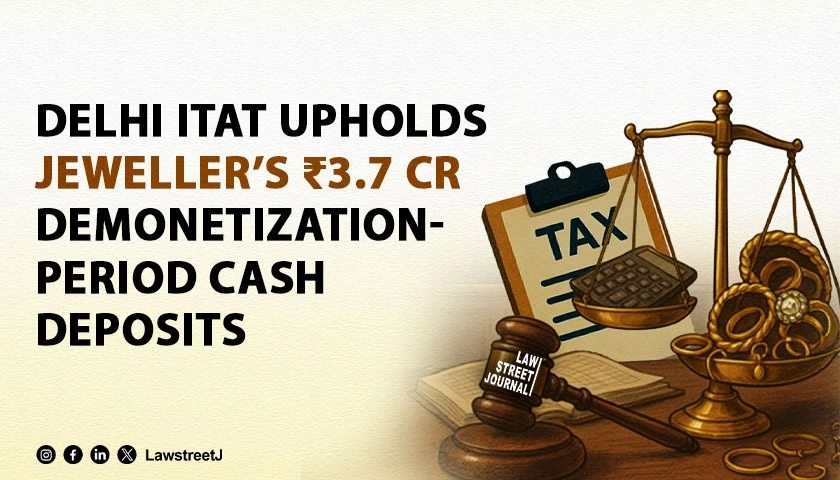New Delhi: The Delhi Income Tax Appellate Tribunal has dismissed the Revenue’s appeal challenging the deletion of an addition of ₹3,72,69,265 made under Section 68 of the Income Tax Act, ruling that cash deposits by jewellers during the demonetization period arising from genuine sales cannot be treated as unexplained cash credits.
The bench comprising Ms. Madhumita Roy (Judicial Member) and Shri Naveen Chandra (Accountant Member) delivered the judgment in ITA No.4039/Del/2024 for Assessment Year 2017–18, emphasizing that the extraordinary circumstances of demonetization warranted a nuanced approach to cash transactions.
The tribunal addressed the case of Sunita Gold and Diamonds Pvt. Ltd., which had deposited ₹3,54,70,000 across three bank accounts (HDFC Bank, Punjab National Bank & Yes Bank Limited) between November 9, 2016 and December 30, 2016, following the demonetization announcement.
The assessee, engaged in trading gold and diamond jewellery, claimed the deposits originated from cash sales of ₹2,06,55,451 made through 206 transactions on November 8, 2016, and cash advances of ₹1,29,19,190 received from customers on the same date.
The Assessing Officer rejected this explanation, terming it a “cooked story,” and argued it was humanly impossible to execute 206 sales invoices in a single day. The tribunal noted: “The AO observed that November 2016 is the only month of Financial Year 2016–17 when the assessee company reported astronomical and extraordinary cash sales/receipt of cash advances exceeding ₹2 crores.”
However, the CIT(A) deleted the addition, observing that cash sales represented a consistent business pattern. The tribunal recorded: “Cash sales in the relevant assessment year 2017–18 were not exorbitant or out of the ordinary as alleged by the Assessing Officer, but were in fact in line with the trend of earlier years.”
The assessee’s cash sales pattern showed consistency across years:
- FY 2015–16: 75% of total sales
- FY 2016–17: 78% of total sales
- FY 2017–18: 56% of total sales
Further, the tribunal emphasized the seasonal business justification, noting: “The appellant registered sales of approximately ₹2,24,41,204 in the month of November, which coincided with Diwali, Dhanteras, and the wedding season — traditionally high-demand periods for gold and jewellery purchases.”
The tribunal found that the demonetization announcement created extraordinary market conditions. The bench observed: “When suddenly on 08.11.2016, the extraordinary event happened and the Hon’ble Prime Minister announced the decision to demonetize old ₹1000/₹500 currency notes, many people, having cash, came out in large numbers to utilize old notes for buying bullion, jewellery, etc.”
Key factors supporting the tribunal’s decision included the assessee’s comprehensive documentation comprising income tax returns, month-wise sales details, cash book extracts, bank statements, VAT returns, and stock details. Significantly, the books of accounts were not rejected by the AO, and no discrepancies were found in stock or purchase records.
The tribunal emphasized the fundamental principle against double taxation, stating: “Once the sale proceeds received are accounted for as income, then further addition under Section 68 on account of cash sales amounts to double taxation and inclusion of the same amount as income twice.”
The bench relied on multiple precedents, including Fine Gujaranwala Jewellers vs. ITO (Delhi Tribunal), DCIT vs. Manuvel Malabar Jewellers Pvt. Ltd., and ACIT vs. Hirapanna Jewellers (Visakhapatnam Tribunal).
In a particularly strong endorsement of the CIT(A)’s reasoning, the tribunal stated: “Having regard to the entire aspect of the matter, in the absence of concrete evidence in the hands of the Revenue to show that the assessee’s sales were bogus — particularly when the books of accounts were not rejected and the VAT return clearly corroborates the impugned sales — the order passed by the Ld. CIT(A) deleting the addition is found to be just and proper.”
The tribunal also addressed a secondary issue regarding disallowance of ₹28,50,886 under Section 40A(3) for cash payments. It provided partial relief for ₹15,16,115 paid on Sundays, covered under Rule 6DD exception for holiday payments, while upholding disallowance for weekday transactions.
The bench noted: “Out of the purchases of ₹28,50,886, a total payment of ₹15,16,115 was made in cash on Sunday and the balance amount of ₹13,34,771 was made on weekdays, particularly Wednesday.”
Mr. Upvan Gupta, Advocate appeared for the assessee, while Mr. Manish Gupta, Senior DR represented the Revenue.
Case Title: Income Tax Officer vs. Sunita Gold and Diamonds Pvt. Ltd.



![Rajasthan High Court upholds Income Tax Notice based on WhatsApp Chats as valid evidence [Read Judgment]](/secure/uploads/2025/04/lj_8082_Rajasthan_High_Court_upholds.webp)
![IT authorities to be informed if suit involved cash transaction of Rs two lakh or more: SC [Read Judgment]](/secure/uploads/2025/04/lj_1723_Inform_IT_authorities_if_suit.webp)
![Income Tax Reassessment After 3 Years Needs Chief Commissioner Approval: Madras HC [Read Order]](/secure/uploads/2025/11/lj_2646_Income_Tax_Reassessment.webp)




